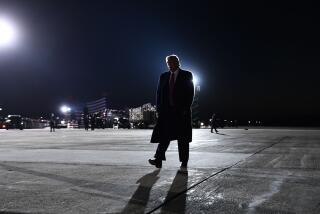Clinton Rejects Racially Based Theory on IQs
- Share via
WASHINGTON — Injecting himself into a bitter and extremely sensitive national debate, President Clinton on Friday decisively rejected a new theory that black Americans are doomed to economic and social underachievement because they are intellectually inferior to whites and Asians.
At a White House press conference that touched on a broad range of domestic and foreign policy questions, Clinton was asked his opinion of an explosive new book which claims that African Americans as a group have lower IQ scores than whites and thus are fated to lag behind the majority of American society because intelligence is the chief determinant of success in modern America.
Clinton said that he had not read the book, “The Bell Curve,” by conservative scholar Charles Murray and the late Harvard psychologist Richard Herrnstein.
But, Clinton said: “As I understand the argument of it, I have to say I disagree with the proposition that there are inherent racially based differences in the capacity of the American people to reach their full potential. I just don’t agree with that. It goes against our entire history and our whole tradition.”
The controversial book does not say whether the measured difference in black and white IQ scores results from genetic differences or from the more difficult environment in which many blacks grow up. But the authors argue that the gap in part accounts for the pervasive poverty in black America.
Clinton acknowledged that the question of race and poverty is “a very serious and complicated issue.” He said that the answer should not be in finding scapegoats or creating pseudo-scientific categories but in trying to structure society and government to permit “every kid in this country to live up to the fullest of their potential.”
On another racially charged question, Clinton defended his Justice Department’s recent decision to support the firing of a white teacher in Piscataway, N.J., as part of the local school district’s effort to promote racial diversity on its faculty.
He said that the district had to choose between two identically qualified teachers, one black and one white, and that on “very narrow grounds” he supported the Justice Department’s position supporting the district’s decision to retain the black teacher.
But he said that in a different circumstance--a white teacher on a largely black faculty, for example--he would support retaining the white teacher.
Turning to the fall political campaign, Clinton said that--despite the bleak outlook for Democrats nationwide--prospects for his party had improved slightly in the last few days.
“We didn’t want to peak too soon,” the President joked.
Clinton appeared resigned to large Democratic losses in both the House and the Senate, noting that the incumbent party almost always loses seats in midterm elections. Trying to put a positive spin on what is certain to be bad news on Nov. 8, Clinton said that the losses would be the result of “a lag between when you do something and when people feel it. And, of course, this is an extremely contentious time.”
He said that he would abide by the voters’ judgment, however harsh. And he vowed to press the new Congress to work with him as he tries to reform the nation’s medical and welfare systems and bring greater accountability to Congress itself.
In an otherwise statesmanlike performance, Clinton could not resist a couple of hard partisan shots at Republicans Newt Gingrich and Oliver L. North.
Noting that Gingrich had called him the “enemy of normal Americans,” Clinton said that the Georgia representative, who aspires to be Speaker of the House, sometimes says and does “weird things.” But he acknowledged that the atmosphere in Washington is “abnormal.”
On North, Clinton strongly denied the Virginia Senate candidate’s charge that he (Clinton) had promised former Virginia governor L. Douglas Wilder an ambassadorship in return for Wilder’s endorsement of North’s opponent, Democratic Sen. Charles S. Robb.
“That just did not happen. I would not do that,” Clinton said. “I would never be part of that.”
Clinton added: “Now, you know, Oliver North says a lot of things and, you know, if you’ve got $17.5 million to buy your own version of the truth, then you don’t have to be held apparently to the same standards that other people do. I noticed . . . he said that I wasn’t his commander in chief. Someone asked me if it bothered me. I said it didn’t bother me nearly as much as the fact he didn’t act as if Ronald Reagan was his commander in chief either, when he had a chance.”
Clinton used his opening statement to remind voters of the Administration’s changes in the student loan program, which he called “a very good deal” to help working families pay for college education.
He said that the program would save taxpayers $4.3 billion and student borrowers $2 billion in lower fees.
In response to a question, Clinton said that First Lady Hillary Rodham Clinton continues to have an active role in setting Administration policy on health care and other matters.
“Well, you bet she does,” Clinton said. He added that she is maintaining a full schedule of political appearances this fall and would be a central player as the Administration regroups and tries to put together a health care reform plan that it can sell to Congress and the public.
More to Read
Get the L.A. Times Politics newsletter
Deeply reported insights into legislation, politics and policy from Sacramento, Washington and beyond. In your inbox twice per week.
You may occasionally receive promotional content from the Los Angeles Times.










